人教版八年级下册英语Unit1单元知识梳理与练习
- 格式:pptx
- 大小:315.16 KB
- 文档页数:43
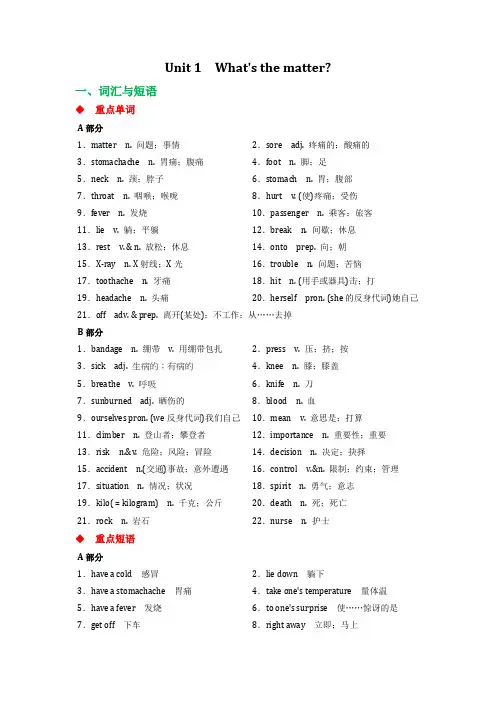
Unit 1 What's the matter?一、词汇与短语◆重点单词A部分1.matter n. 问题;事情2.sore adj. 疼痛的;酸痛的3.stomachache n. 胃痛;腹痛4.foot n. 脚;足5.neck n. 颈;脖子6.stomach n. 胃;腹部7.throat n. 咽喉;喉咙8.hurt v. (使)疼痛;受伤9.fever n. 发烧10.passenger n. 乘客;旅客11.lie v. 躺;平躺12.break n. 间歇;休息13.rest v. &n. 放松;休息14.onto prep. 向;朝15.X-ray n. X射线;X光16.trouble n. 问题;苦恼17.toothache n. 牙痛18.hit n. (用手或器具)击;打19.headache n. 头痛20.herself pron. (she的反身代词)她自己21.off adv. & prep. 离开(某处);不工作;从……去掉B部分1.bandage n. 绷带v. 用绷带包扎2.press v. 压;挤;按3.sick adj. 生病的;有病的4.knee n. 膝;膝盖5.breathe v. 呼吸6.knife n. 刀7.sunburned adj. 晒伤的8.blood n. 血9.ourselves pron. (we反身代词)我们自己10.mean v. 意思是;打算11.climber n. 登山者;攀登者12.importance n. 重要性;重要13.risk n.&v. 危险;风险;冒险14.decision n. 决定;抉择15.accident n.(交通)事故;意外遭遇16.control v.&n. 限制;约束;管理17.situation n. 情况;状况18.spirit n. 勇气;意志19.kilo( = kilogram) n. 千克;公斤20.death n. 死;死亡21.rock n. 岩石22.nurse n. 护士◆重点短语A部分1.have a cold 感冒2.lie down 躺下3.have a stomachache 胃痛4.take one's temperature 量体温5.have a fever 发烧6.to one's surprise 使……惊讶的是7.get off 下车8.right away 立即;马上9.take breaks (take a break) 休息10.talk too much 说得太多11.drink enough water 喝足够的水12.have a very sore throat 嗓子非常疼13.get an X-ray 拍X光片14.see a dentist 看牙医15.drink some hot tea with honey 喝一些加蜂蜜的热茶16.put some medicine on sth.在……上面敷一些药17.feel very hot 感到很热18.sound like 听起来像19.all weekend 整个周末20.in the same way 以同样的方式21.go to a doctor 看医生22.go along 沿着……走23.on the side of the road 在马路边24.shout for help 大声呼救25.without thinking twice 没有多想26.have a heart problem 有心脏病27.thanks to 多亏了;由于28.in time 及时29.save a life 挽救生命30.get into trouble 陷入麻烦31.hurt oneself 受伤32.fall down落下;摔倒B部分1.be used to 习惯于……;适应于……2.in a difficult situation 在困境中3.take risks (take a risk) 冒险4.keep on doing sth. 继续(或坚持)做某事5.run out (of) 用尽;耗尽6.make a decision 作出决定7.cut off 切除8.get hit on the head 撞到头部9.get out of 离开;从……岀来10.be interested in 对……感兴趣11.give up 放弃12.mean doing sth. 意味着做某事13.put a bandage on sth. 用绷带包扎…14.lose one's life 失去生命15.feel sick 感到恶心16.mountain climbing 登山运动17.have problems breathing 呼吸困难18.be in control of 掌管;管理◆重点句子A部分1.What's the matter with you?=What's the trouble with you?=What's wrong with you?你怎么了?2.What should she do? 她该怎么办呢?3.Did you fall down? 你跌倒了吗?4.Should I take my temperature? 我应该量一下体温吗?5.I think I sat in the same way for too long without moving.我想我以同样的姿势一动不动地坐得太久了。
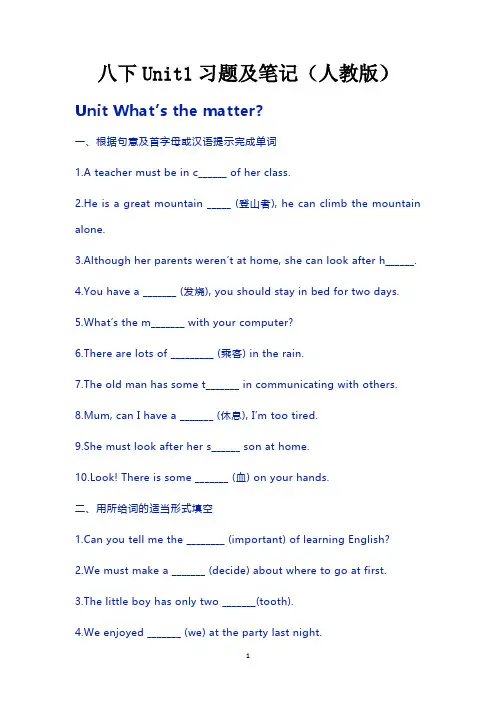
八下Unit1习题及笔记(人教版)Unit What’s the matter?一、根据句意及首字母或汉语提示完成单词1.A teacher must be in c______ of her class.2.He is a great mountain _____ (登山者), he can climb the mountain alone.3.Although her parents weren’t at home, she can look after h______.4.You have a _______ (发烧), you should stay in bed for two days.5.What’s the m_______ with your computer?6.There are lots of _________ (乘客) in the rain.7.The old man has some t_______ in communicating with others.8.Mum, can I have a _______ (休息), I’m too tired.9.She must look after her s______ son at home.10.Look! There is some _______ (血) on your hands.二、用所给词的适当形式填空1.Can you tell me the ________ (important) of learning English?2.We must make a _______ (decide) about where to go at first.3.The little boy has only two _______(tooth).4.We enjoyed _______ (we) at the party last night.5.Can you pass me two _______ (knife)?6.What’s the _______ (mean) of this word?7.We are very sad because of his ______ (die).8.You need to take some ________ (medicine) if you have a cough.9.They kept working ______(with) having a rest all day.10.She needs _______ (finish) her homework in two hours.三、单项选择( )1. The box is _______ heavy, I can’t lift it.A.too manyB. too muchC. many tooD. much too( )2. The boy is _______ to go to school.A.old enoughB. young enoughC. enough oldD. enough young( )3. I like coffee ______ milk and sugar because it tastes sweet. A.withoutB. withC. inD. on( )4. My mother ______ me the zoo if she _____ free.A.will take; will beB. takes; isC. will take; isD. takes; will be( )5. Betty is a ______ girl.A.six - year - oldB. six - years - oldC. six year oldD. six years old( )6. Here is ______ water, let’s buy some.A.a fewB. a littleC. fewD. little( )7. She used ______ in the city but she is used ______ in the countryside.A.to live; to liveB. living; livingC. to living; to liveD. to live; to living( )8. He got up early ______ he can catch the first bus.A.in order toB. so thatC. soD. because( )9. Lily kept _______ all night.A.on studyB. on studyingC. studyD. to study( )10. Don’t give up _______ your dream.A.chaseB. to chaseC. chasingD. in chasing四、翻译句子1.托尼非常乐于助人。
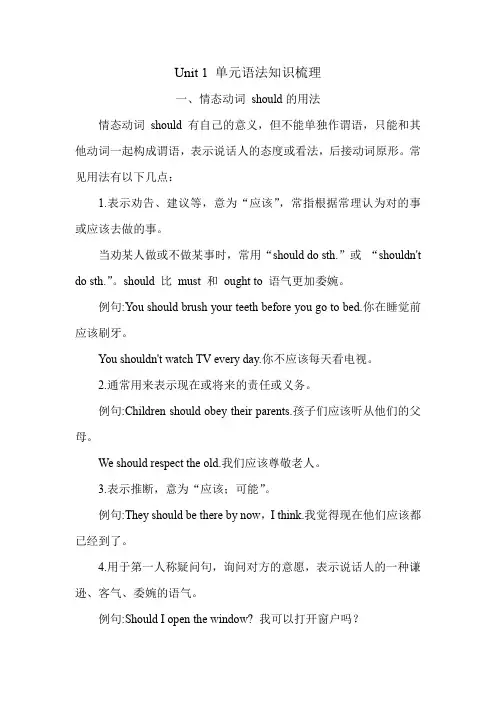
Unit 1 单元语法知识梳理一、情态动词should的用法情态动词should有自己的意义,但不能单独作谓语,只能和其他动词一起构成谓语,表示说话人的态度或看法,后接动词原形。
常见用法有以下几点:1.表示劝告、建议等,意为“应该”,常指根据常理认为对的事或应该去做的事。
当劝某人做或不做某事时,常用“should do sth.”或“shouldn't do sth.”。
should 比must 和ought to 语气更加委婉。
例句:You should brush your teeth before you go to bed.你在睡觉前应该刷牙。
You shouldn't watch TV every day.你不应该每天看电视。
2.通常用来表示现在或将来的责任或义务。
例句:Children should obey their parents.孩子们应该听从他们的父母。
We should respect the old.我们应该尊敬老人。
3.表示推断,意为“应该;可能”。
例句:They should be there by now,I think.我觉得现在他们应该都已经到了。
4.用于第一人称疑问句,询问对方的意愿,表示说话人的一种谦逊、客气、委婉的语气。
例句:Should I open the window? 我可以打开窗户吗?What should we do now? 我们现在该干什么呢?5.表示某种感情色彩,意为“竟会”,常用于以how, why开头引导的特殊疑问句中。
例句:Why should you be so early today? 你今天为什么会如此早?二、反身代词1.反身代词的构成反身代词是一种表示反射或强调的代词。
它由第一人称、第二人称的形容词性物主代词和第三人称代词的宾格加词尾-self或-selves构成。
其构成如下表:反身代词与它所指代的名词或代词形成互指关系,两者在人称和数上应保持一致。
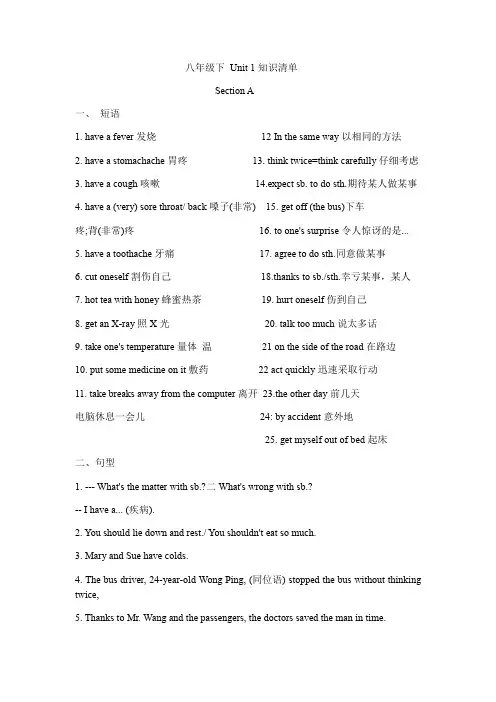
八年级下Unit 1知识清单Section A一、短语1. have a fever发烧12 In the same way以相同的方法2. have a stomachache胃疼13. think twice=think carefully仔细考虑3. have a cough咳嗽14.expect sb. to do sth.期待某人做某事4. have a (very) sore throat/ back嗓子(非常) 15. get off (the bus)下车疼;背(非常)疼16. to one's surprise令人惊讶的是...5. have a toothache牙痛17. agree to do sth.同意做某事6. cut oneself割伤自己18.thanks to sb./sth.幸亏某事,某人7. hot tea with honey蜂蜜热茶19. hurt oneself伤到自己8. get an X-ray照X光20. talk too much说太多话9. take one's temperature量体温21 on the side of the road在路边10. put some medicine on it敷药22 act quickly迅速采取行动11. take breaks away from the computer离开23.the other day前几天电脑休息一会儿24: by accident意外地25. get myself out of bed起床二、句型1. --- What's the matter with sb.?二What's wrong with sb.?-- I have a... (疾病).2. You should lie down and rest./ You shouldn't eat so much.3. Mary and Sue have colds.4. The bus driver, 24-year-old Wong Ping, (同位语) stopped the bus without thinking twice,5. Thanks to Mr. Wang and the passengers, the doctors saved the man in time.三、知识点讲解一、疾病、事故的表达1. have a部位+不空格+ache have a toothache2. have a sore+空格+部位have a sore throat3. have a+名词( fever/ cold/ cancer)have a pain in/on 十部位4.部位+hurt My neck hurts.5.动词词组: cut oneself ; hurt oneself; fall down from; fall off二、He expected most or all the passengers to get off and wait for another bus.下车+大型,敞开的交通工具get off the bus; get off the bike; get off the trainI am new here. Could you please tell me where I should get off?When I saw the crying baby, I got off the bike and asked him why.注: 反义: get on ....get out of...下车+空间狭小的交通工具The rich lady got out of the car with her pretty dog without looking at anybody.注:反义: get into ...三、He expected most or all the passengers to get off and wait for another bus.expect的用法Vt.期待期待做某事expect to do sth. = look forward to doing sth.He expected to hear from Mary.期待某事expect sth.These American businessmen are expecting a cooperation from us.Little Tony really expected a full agreement from his father that he could join thearmy.期待某人做某事expect sb. to do sth.I expect my sister to come back early so that we can go to Avril's concert together.expect+从句They are in trouble, but I expect that they can deal with it themselves.四、Thanks to Mr. Wang and the passengers, the doctors saved the man in time.thanks to幸亏,由于+好的结果= because of +好/不好的事情We don't need to take the P.E. exam, thanks to the heavy rain.He saved the city thanks to his brilliance and his goodwill.他用他的智慧与仁政拯万民于水火。
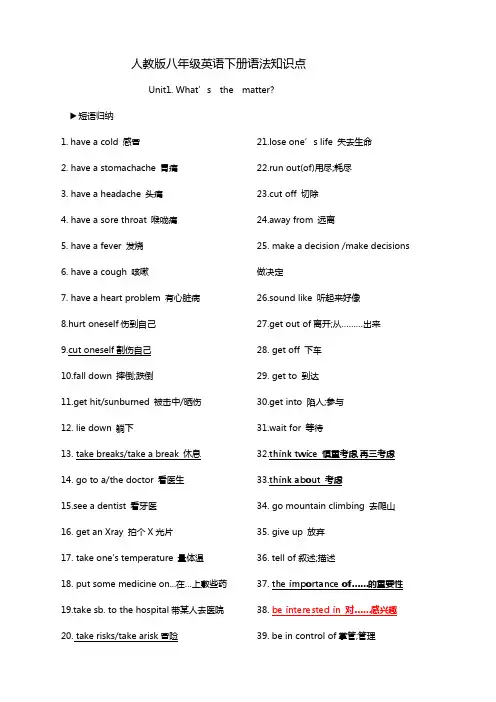
人教版八年级英语下册语法知识点Unit1. What’s the matter?▶短语归纳1.have a cold 感冒2. have a stomachache 胃痛3. have a headache 头痛4. have a sore throat 喉咙痛5. have a fever 发烧6. have a cough 咳嗽7. have a heart problem 有心脏病8.hurt oneself伤到自己9.cut oneself割伤自己10.fall down 摔倒;跌倒11.get hit/sunburned 被击中/晒伤12. lie down 躺下13. take breaks/take a break 休息14. go to a/the doctor 看医生15.see a dentist 看牙医16. get an Xray 拍个X光片17. take one's temperature 量体温18. put some medicine on...在…上敷些药19.take sb. to the hospital带某人去医院20. take risks/take arisk冒险21.lose one’s life 失去生命22.run out(of)用尽;耗尽23.cut off 切除24.away from 远离25. make a decision /make decisions 做决定26.sound like 听起来好像27.get out of离开;从………出来28. get off 下车29. get to 到达30.get into 陷人;参与31.wait for 等待32.think twice 慎重考虑,再三考虑33.think about 考虑34. go mountain climbing 去爬山35. give up 放弃36. tell of叙述;描述37. the importance of……的重要性38. be interested in 对……感兴趣39. be in control of掌管;管理40.to one ’s surprise 使某人惊讶的是; 出乎某人的意料 41.thanks to 多亏;由于 42.in time 及时43.right away=at once 立即;马上 44. because of 因为 45.by oneself 独自;单独 46. too much 太多 47.a few 一些48.all weekend 整个周末 49. so that 以便▶用法集萃sth.需要某物1. needto do sth.需要做某事doing sth.某事需要被做2. see sb ..doing sth.看见某人正在做某事 do sth.看见某人做了某事3.mean to do sth.打算做某事 doing sth.意味着做某事4. expect/want (sb. ) to do sth 期待(某人)做某事/想要(某人)做某事 6. seem(to be)+形容词 好像……seem to do sth.好像做某事 seem + that 从句 好像.…7. agree/happen to do sth. 同意做某事/碰巧做某事 8.help sb.(to)do sth. 帮助某人做某事9.tell sb.(not)to do sth. 告诉某人(不要)做某事10.have problems(in)doing sth. 做某事有困难11. use sth. to do sth.= use sth. for doing sth.用某物做某事12. give up/ keep on doing sth. 放弃做某事/继续做某事13.mind doing sth.介意做某事14.so+形容词/副词+that从句15.It is/was+形容词+ that 从句如此……以至于…"某事是…▶语法专项一.询问某人的健康问题及遇到麻烦时的常用表达1.询问某人患了何种疾病或遇到了何种麻烦时,常用以下几种结构来表达: What's the matter (with sb.)?(某人)怎么了?What's wrong (with sb.)?(某人)怎么了?What's the trouble ( with sb.)?/ (某人)出什么事了?What happened (to sb.)?(某人)发生什么事了?Are you OK?你没事吧?Is there anything wrong( with sb. )?(某人)有什么事吗?2.要表达身体某一部位疼痛或不舒服,可用以下结构:(1)某人+have/has+病症The twins have colds.这对双胞胎感冒。
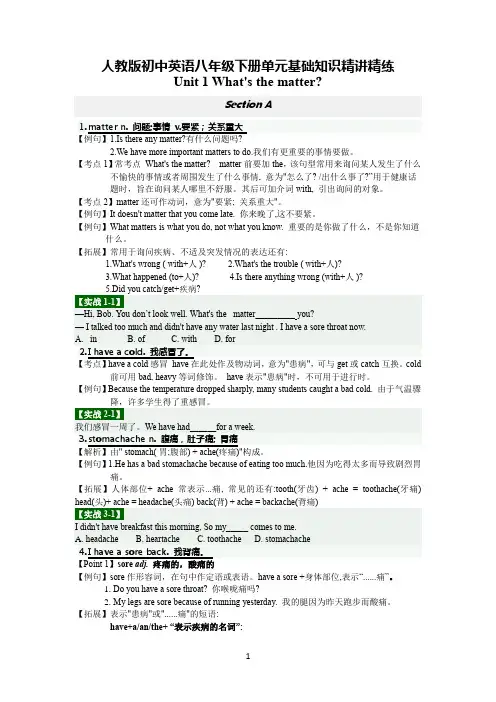
人教版初中英语八年级下册单元基础知识精讲精练Unit 1 What's the matter?Section A2.We have more important matters to do.我们有更重要的事情要做。
【考点1】常考点What's the matter? matter前要加the,该句型常用来询问某人发生了什么不愉快的事情或者周围发生了什么事情, 意为"怎么了? /出什么事了?”用于健康话题时,旨在询问某人哪里不舒服。
其后可加介词with, 引出询问的对象。
【考点2】matter还可作动词,意为"要紧; 关系重大"。
【例句】It doesn't matter that you come late. 你来晚了,这不要紧。
【例句】What matters is what you do, not what you know. 重要的是你做了什么,不是你知道什么。
【拓展】常用于询问疾病、不适及突发情况的表达还有:1.What's wrong(with+人)?2.What's the trouble(with+人)?3.What happened(to+人)?4.Is there anything wrong(with+人)?5.Did you catch/get+疾病?【实战1-1】—Hi,Bob.You don’t look well.What's the matter_________you?—I talked too much and didn't have any water last night . I have a sore throat now.A. inB.ofC.withD. for2.I have a cold. 我感冒了。
【考点】have a cold感冒have在此处作及物动词,意为"患病",可与get或catch互换。
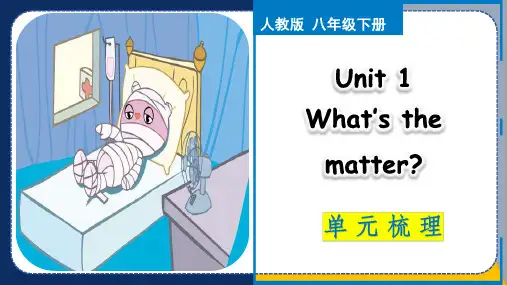
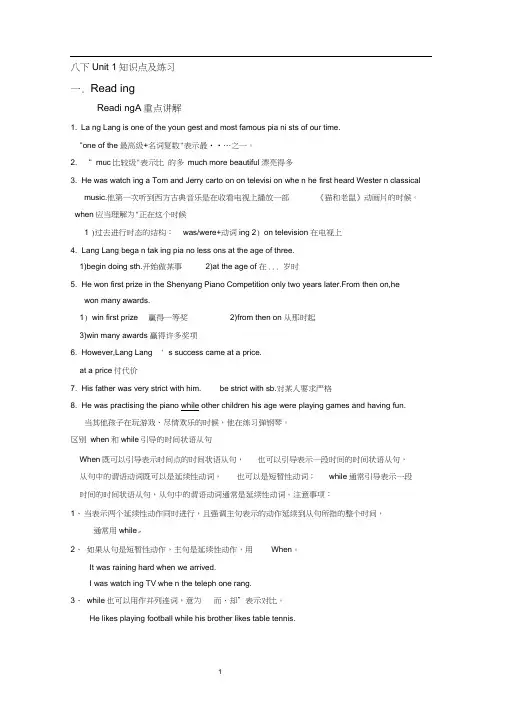
八下Unit 1知识点及练习一. Read ingReadi ngA重点讲解1. La ng Lang is one of the youn gest and most famous pia ni sts of our time.“one of the最高级+名词复数"表示最••…之一。
2. “ muc比较级"表示比的多much more beautiful漂亮得多3. He was watch ing a Tom and Jerry carto on on televisi on whe n he first heard Wester n classicalmusic.他第一次听到西方古典音乐是在收看电视上播放一部《猫和老鼠》动画片的时候。
when应当理解为"正在这个时候1 )过去进行时态的结构:was/were+动词ing 2) on television 在电视上4. Lang Lang bega n tak ing pia no less ons at the age of three.1)begin doing sth.开始做某事2)at the age of 在... 岁时5. He won first prize in the Shenyang Piano Competition only two years later.From then on,hewon many awards.1) win first prize 赢得一等奖2)from then on 从那时起3)win many awards 赢得许多奖项6. However,Lang Lang ' s success came at a price.at a price付代价7. His father was very strict with him. be strict with sb.对某人要求严格8. He was practising the piano while other children his age were playing games and having fun.当其他孩子在玩游戏、尽情欢乐的时候,他在练习弹钢琴。
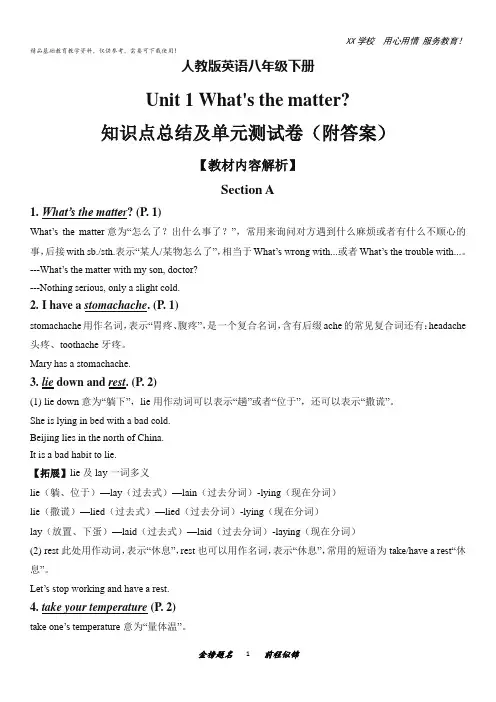
精品基础教育教学资料,仅供参考,需要可下载使用!人教版英语八年级下册Unit 1 What's the matter?知识点总结及单元测试卷(附答案)【教材内容解析】Section A1.What’s the matter? (P. 1)What’s the matter意为“怎么了?出什么事了?”,常用来询问对方遇到什么麻烦或者有什么不顺心的事,后接with sb./sth.表示“某人/某物怎么了”,相当于What’s wrong with...或者What’s the trouble with...。
---What’s the matter with my son, doctor?---Nothing serious, only a slight cold.2.I have a stomachache. (P. 1)stomachache用作名词,表示“胃疼、腹疼”,是一个复合名词,含有后缀ache的常见复合词还有:headache 头疼、toothache牙疼。
Mary has a stomachache.3.lie down and rest. (P. 2)(1)lie down意为“躺下”,lie用作动词可以表示“趟”或者“位于”,还可以表示“撒谎”。
She is lying in bed with a bad cold.Beijing lies in the north of China.It is a bad habit to lie.【拓展】lie及lay一词多义lie(躺、位于)—lay(过去式)—lain(过去分词)-lying(现在分词)lie(撒谎)—lied(过去式)—lied(过去分词)-lying(现在分词)lay(放置、下蛋)—laid(过去式)—laid(过去分词)-laying(现在分词)(2)rest此处用作动词,表示“休息”,rest也可以用作名词,表示“休息”,常用的短语为take/have a rest“休息”。
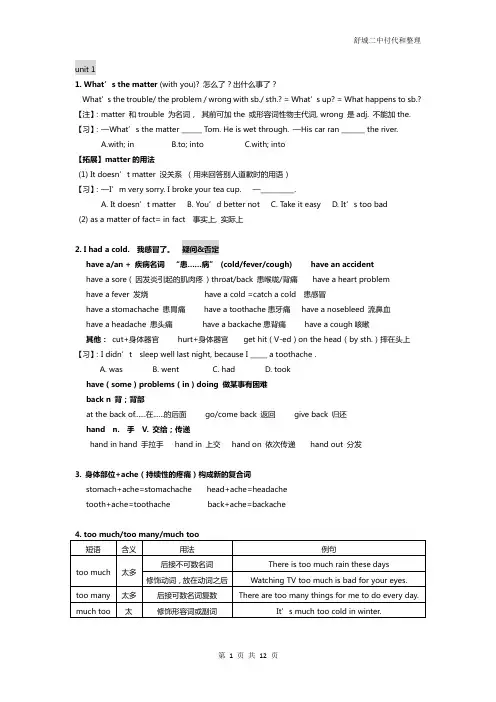
unit 11. What’s the matter (with you)? 怎么了?出什么事了?What’s the trouble/ the problem / wrong with sb./ sth.? = What’s up? = What happens to sb.? 【注】:matter 和trouble 为名词,其前可加the 或形容词性物主代词, wrong 是adj. 不能加the. 【习】:—What’s the matter ______ Tom. He is wet through. —His car ran _______ the river.A.with; inB.to; intoC.with; into【拓展】matter的用法(1) It doesn’t matter 没关系(用来回答别人道歉时的用语)【习】:—I’m very sorry. I broke your tea cup. —__________.A. It doesn’t matterB. You’d better notC. T ake it easyD. It’s too bad(2) as a matter of fact= in fact 事实上, 实际上2.I had a cold. 我感冒了。
疑问&否定have a/an + 疾病名词“患……病”(cold/fever/cough) have an accidenthave a sore ( 因发炎引起的肌肉疼) throat/back 患喉咙/背痛have a heart problemhave a fever 发烧have a cold =catch a cold 患感冒have a stomachache 患胃痛have a toothache患牙痛have a nosebleed 流鼻血have a headache 患头痛have a backache患背痛have a cough咳嗽其他:cut+身体器官hurt+身体器官get hit ( V-ed ) on the head(by sth.)摔在头上【习】:I didn’t sleep well last night, because I _____ a toothache .A. wasB. wentC. hadD. tookhave ( some ) problems ( in ) doing 做某事有困难back n 背;背部at the back of......在......的后面go/come back 返回give back 归还hand n. 手V. 交给;传递hand in hand 手拉手hand in 上交hand on 依次传递hand out 分发3. 身体部位+ache(持续性的疼痛)构成新的复合词stomach+ache=stomachache head+ache=headachetooth+ache=toothache back+ache=backache【习】:Mr. Smith eats ______ food, so he’s _____ fat.A .much too; too muchB .too many; much tooC. too much; too muchD. too much ;much tooenough 的用法(1) adj.足够的,充分的。
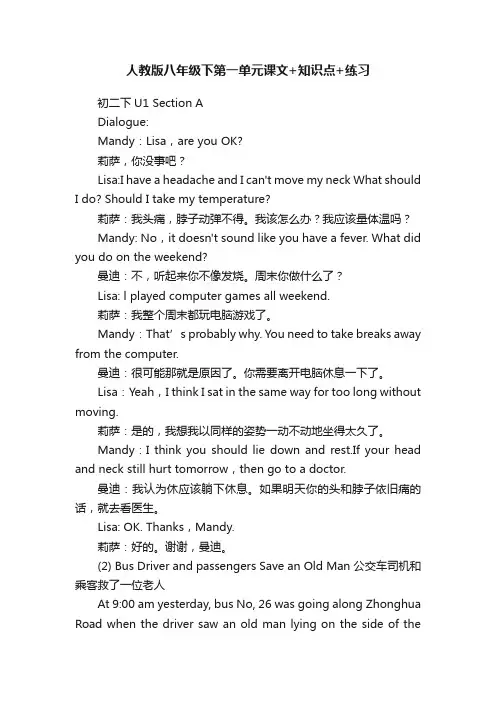
人教版八年级下第一单元课文+知识点+练习初二下U1 Section ADialogue:Mandy:Lisa,are you OK?莉萨,你没事吧?Lisa:I have a headache and I can't move my neck What should I do? Should I take my temperature?莉萨:我头痛,脖子动弹不得。
我该怎么办?我应该量体温吗?Mandy: No,it doesn't sound like you have a fever. What did you do on the weekend?曼迪:不,听起来你不像发烧。
周末你做什么了?Lisa: l played computer games all weekend.莉萨:我整个周末都玩电脑游戏了。
Mandy:That’s probably why. You need to take breaks away from the computer.曼迪:很可能那就是原因了。
你需要离开电脑休息一下了。
Lisa:Yeah,I think I sat in the same way for too long without moving.莉萨:是的,我想我以同样的姿势一动不动地坐得太久了。
Mandy:I think you should lie down and rest.If your head and neck still hurt tomorrow,then go to a doctor.曼迪:我认为休应该躺下休息。
如果明天你的头和脖子依旧痛的话,就去看医生。
Lisa: OK. Thanks,Mandy.莉萨:好的。
谢谢,曼迪。
(2) Bus Driver and passengers Save an Old Man 公交车司机和乘客救了一位老人At 9:00 am yesterday, bus No, 26 was going along Zhonghua Road when the driver saw an old man lying on the side of theroad. A woman next to him was shouting for help.昨天上午九点,26路公交车正行驶在中华路上,这时司机看到一位老人躺在路边。
八年级下册Unit 1 单元笔记1. There will only be one country.将会只有一个国家。
There will be 是there be句型的将来时。
e.g. There won't be any paper money. (否定)Will there be less pollution? (疑问)Yes, there will./ No, there won't.There will be more people. (肯定) ※常见错误:there will have…2. People will have robots in their homes. 人们家里将会有机器人。
will助动词,表单纯的未来。
用于陈述句表“将……,会……”。
e.g. I will (I'll) be 15 next month.下个月我就15岁了。
Mr. Green will be back soon.否定句:won't = will not eg. He won't be back before 10.will用于疑问句意为“会……吗?”e.g. Will you be f ree on Friday evening?Will people have robots?3. in 与after的区别例句:I'll be back in half an hour. 我半小时后就回来.本句中的in作"以后"解,不能用after代替。
after和in都可以表示"以后"的意思,其区别是:1)after以过去为起点,表示过去一段时间以后,常用于过去时态的句子。
例如:They started working after lunch. 他们是午餐后开始工作的。
The film was shown after the meeting. 电影是会议结束以后放的。
人教版八年级下册英语课本知识点梳理Unit 1 wh at’s the matter? sectionA课文内容:What's the matter? 怎么了? (教材第1页)【用法详解】What's the matter? 怎么了?/出什么事了?常用于询问某人患了何种疾病,遇到了什么困难等,也可用于询问某物出了什么故障,其后可接with sb./sth.,表示“某人/某物怎么了?”。
其中matter 用作名词,意为“问题;事情”matter前须加定冠词the。
【例句】What's the matter? 怎么了?Bad luck.I lost my pen. 真倒霉,我弄丢了钢笔.What's the matter with him? 他怎么了?He has a sore back.他背痛【拓展】matter[动词] 要紧;有关系多用在否定句、疑问句或条件句中It doesn't matter.没关系。
(通常用来回答对方的道歉)I have a cold. 我感冒了。
(教材第1页)【用法详解】have a cold (患)感冒。
其中have 用作及物动词,意为“患(病);遭受(病痛)”,常用于结构“have a/an +疾病名称”表示患病或身体某部位不舒服。
此时它不能用于进行时态,其第三人称单数形式为has,过去式为had。
常见的表示病痛的短语还有:have a fever 发烧have a toothache 牙疼have a headache头痛have a cough 咳嗽have a stomachache胃痛Do you often have a cold? 你经常感冒吗?Jim had a stomachache after supper yesterday.吉姆昨天晚饭后胃痛。
l have a stomachache.我胃痛。
( 教材第1 页)【用法详解】stomachache [名词]胃痛;腹痛是由“名词stomach(;腹部)+ache(疼痛)”构成的复合名词。
Unit 1 What’s the matter?1.重点词汇:foot, knee, neck, stomach, throat, matter, cough, fever, headache, stomachache, toothache, nurse, blood, rest, X-ray, situation, spirit, trouble, death, hit, hurt, lie ...2. 短语归纳:1. have a cold 感冒2. have a stomachache 胃痛3. lie down 躺下4. take one’s temperature 量体温5. have a fever 发烧6. take breaks (take a break) 休息7. get off 下车8. to one’s surprise 使……惊讶的;出乎……意料9. right away 立即,马上10. get into陷入;参加11. be used to习惯于……;适应于……12. take risks (take a risk) 冒险13. run out (of) 用尽,耗尽14. get out of离开;从……出来15. be in control of 掌管;管理16. give up放弃3. 必背典句:1. -What’s the matter? -I have a stomachache.-你怎么了?-我胃痛。
2. -What’s the matter with Ben? -He hurt himself.-本怎么了?-他弄伤了自己。
3. -Does he have a toothache? -Yes, he does.-他牙疼吗?-是的,他牙疼。
4. -What should she do? -She should take her temperature.-她应该做什么?-她应该量体温。
人教版八年级下册Unit1知识点及练习.(word版可编辑修改)编辑整理:尊敬的读者朋友们:这里是精品文档编辑中心,本文档内容是由我和我的同事精心编辑整理后发布的,发布之前我们对文中内容进行仔细校对,但是难免会有疏漏的地方,但是任然希望(人教版八年级下册Unit1知识点及练习.(word版可编辑修改))的内容能够给您的工作和学习带来便利。
同时也真诚的希望收到您的建议和反馈,这将是我们进步的源泉,前进的动力。
本文可编辑可修改,如果觉得对您有帮助请收藏以便随时查阅,最后祝您生活愉快业绩进步,以下为人教版八年级下册Unit1知识点及练习.(word版可编辑修改)的全部内容。
Unit 1 Will people have robots?Language points:1. Do you think there will be robots in people’s homes?Do you think 你认为……,通常用来询问对方的看法。
后面常接宾语从句,从句用陈述句的语序。
也可作插入语,常放在特殊疑问词后,结构为:疑问词+do you think +主语+谓语+其它.Do you think he'll come back tomorrow?Who do you think shole her money?What time do you think the train will arrive here?In people’homes, home作名词,家,相当于house.home还可作副词,回家,在家。
He didn’t leave home until he was 21.I’m going home now. See you tomorrow。
辨析 home,family&househome 家乡,指与家人共同居住的地方,侧重强调家庭的氛围。
I regard Beijing as my second home。
人教版八年级下册英语Unit 1 语法知识点复习提纲Unit1 What’s the matter?一、重点短语归纳Section Ahave a cold 感冒have a stomachache 胃痛have a sore throat 嗓子痛too much 太多lie down 躺下take one’s temperature 量体温have a fever 发烧have a headache 头痛sound like 听起来像take breaks 休息go to a doctor 去看医生get off 下车to one’s surprise 使...惊讶的Thanks to... 多亏in time 及时right away 立即;马上get into trouble 陷入麻烦fall down 摔倒Section Bbe interested in... 对...感兴趣be used to 习惯于......take risks 冒险because of 因为run out 用尽have problems breathing 呼吸困难save one’s life 挽救某人的生命cut off 切除get out of 离开;从...中出来be in control of 掌管the importance of... ...的重要性give up 放弃so...that... 如此...以至于...二、话题句型1.询问身体不舒服:When we are not feeling well, we often go to see the doctor. The doctor will ask :(1) What’s wrong (with you)?What’s the matter/trouble (with you)?What’s your trouble?What happens to you?(Is there) anything wrong with you?表示“你怎么了”。
人教版英语八年级下unit1讲解与练习编辑整理:尊敬的读者朋友们:这里是精品文档编辑中心,本文档内容是由我和我的同事精心编辑整理后发布的,发布之前我们对文中内容进行仔细校对,但是难免会有疏漏的地方,但是任然希望(人教版英语八年级下unit1讲解与练习)的内容能够给您的工作和学习带来便利。
同时也真诚的希望收到您的建议和反馈,这将是我们进步的源泉,前进的动力。
本文可编辑可修改,如果觉得对您有帮助请收藏以便随时查阅,最后祝您生活愉快业绩进步,以下为人教版英语八年级下unit1讲解与练习的全部内容。
Unit1 What’s the matter?1.What't the matter ?怎么了 ?matter此处为可数名词,意为“毛病;麻烦”,通常用于句型What’s the matter with sb。
?中。
该问句常用来询问某人患了何种疾病或遇到了何种麻烦。
—What’s the matter with him ? 他怎么了?—He has a headache . 他头痛。
拓展:错误!matter还可作为不及物动词,意为“要紧,有关系”,主要用于否定句,疑问句或者条件句中。
It doesn’t matter . 没有关系。
Does it matter if I’m a bit late ?我晚一会到有关系吗?错误!).no matter 与 who , what , where 等连用, 相当于 whoever , whatever ,wherever 等,可引导让步状语从句。
Do n’t open the door , no matter who comes 。
不管谁来都别开口.2. I have stomachache 。
我胃痛。
Stomachache为可数名词,意为“胃痛;腹痛”Eg:Mary didn’t come to school yesterday because she had a stomachache。